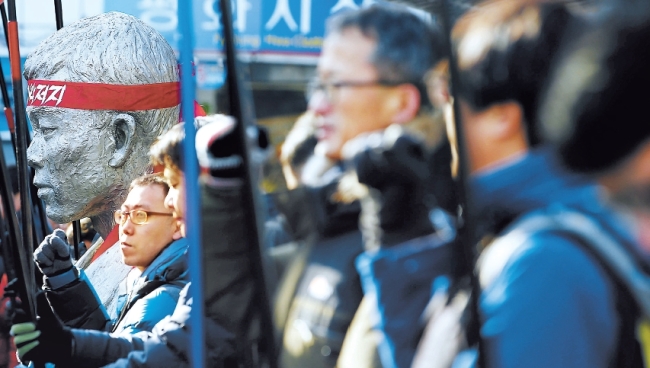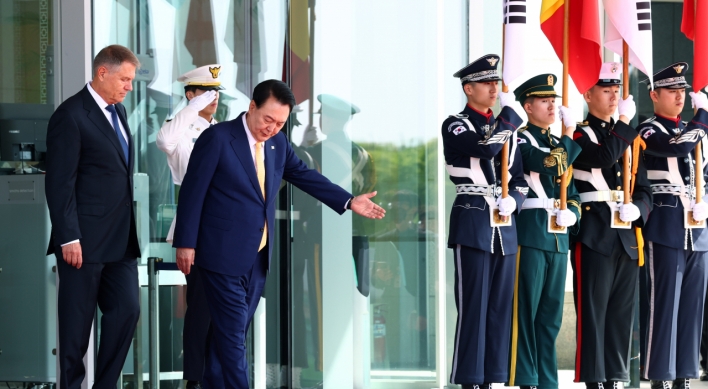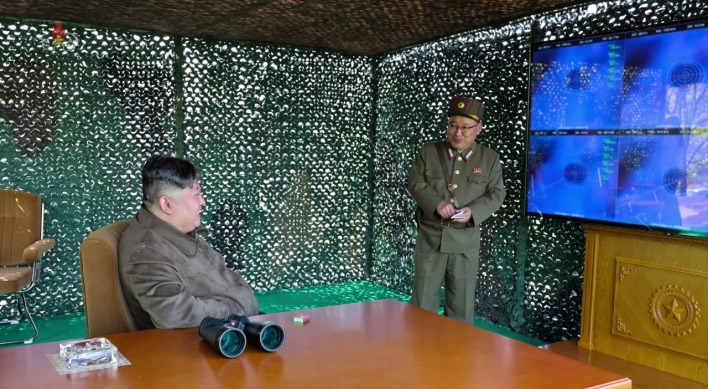South Korea’s labor minister renewed his calls for the passage of labor market reform bills Monday in his New Year’s speech, amid growing resistance from the labor bloc and political wrangling over the pending bills at parliament.
With the National Assembly’s extra session expected to end Friday, Lee Ki-kwon, the minister of employment and labor, underscored the need for bills to revamp the nation’s labor market to create jobs for the young and reduce job uncertainties.
With the National Assembly’s extra session expected to end Friday, Lee Ki-kwon, the minister of employment and labor, underscored the need for bills to revamp the nation’s labor market to create jobs for the young and reduce job uncertainties.

“Last year, we established a foundation for labor market reforms. This year, we need to bear the fruits,” Lee said, referring to the “grand compromise” made last September among management, labor and government representatives.
“Some labor unions are only focusing on improving their labor conditions, ignoring the spirit of trilateral compromise to create a fairer labor market structure,” he said, calling the passage of market reform bills a “safeguard” for the workers on the edge of society.
After months of debate over the labor market revamp, a tripartite committee of labor, business and government agreed on a series of reform measures, including clarifying employment guidelines and adopting the peak wage system on the condition of “sufficient” consultation before pushing for such policies.
While the government pushes ahead with the easing of labor regulations to boost the sluggish economy and add jobs for the young, the nation’s labor unions have fiercely opposed the plan, viewing them as expanding temporary jobs and making it easier for employers to dismiss workers.
Enraged by the government’s announcement of a draft of guidelines on employment guidelines on Dec. 30, the Federation of Korea Trade Unions, one of the negotiators of the trilateral agreement, hinted at a plan to withdraw from the trilateral deal.
“Excluding the labor bloc, the government unilaterally revealed a draft of guidelines on easier dismissals and change of company rules,” Kim Dong-man, head of the nation’s largest umbrella union, said in a statement.
The draft includes the government’s administrative guidelines to ease restrictions for employers to fire underperforming workers and change company rules without unions’ approval.
The prospects for the passage of the key reform bills also remain bleak, as the rival parties have continued to lock horns over the embattled reform plan.
As part of the Park Geun-hye administration’s drive for labor market reform, the ruling Saenuri Party presented five bills related to labor conditions in September following the three-way agreement.
The bills stipulate a reduction in working hours, improvements in benefits for the unemployed, extension of hiring contract workers, expansion of sectors that can employ temporary workers and adoption of the peak wage system.
But the main opposition Minjoo Party of Korea has refused to pass the bills through the National Assembly, mindful of the votes of the 1.4 million workers comprising the two largest umbrella labor unions.
National Assembly Speaker Chung Ui-hwa expressed his hope to pass the embattled bills before the extraordinary session expires Friday. He remains reluctant to exercise his authority to put the bills to a vote without the rival parties’ consent, citing the rule of law.
Earlier in the day, the KCTU announced this year’s plan to resist the government’s push for labor market reforms in central Seoul, vowing to stage a strike Friday after the extra parliamentary session ends.
The FKTU will decide on Friday in an executive meeting whether to join the militant union group Korea Confederation of Trade Unions’ fight against the government.
By Ock Hyun-ju
(laeticia.ock@heraldcorp.com)
-
Articles by Ock Hyun-ju



![[AtoZ into Korean mind] Humor in Korea: Navigating the line between what's funny and not](http://res.heraldm.com/phpwas/restmb_idxmake.php?idx=644&simg=/content/image/2024/04/22/20240422050642_0.jpg&u=)



![[Herald Interview] Why Toss invited hackers to penetrate its system](http://res.heraldm.com/phpwas/restmb_idxmake.php?idx=644&simg=/content/image/2024/04/22/20240422050569_0.jpg&u=20240422150649)

![[Graphic News] 77% of young Koreans still financially dependent](http://res.heraldm.com/phpwas/restmb_idxmake.php?idx=644&simg=/content/image/2024/04/22/20240422050762_0.gif&u=)






![[Exclusive] Korean military set to ban iPhones over 'security' concerns](http://res.heraldm.com/phpwas/restmb_idxmake.php?idx=652&simg=/content/image/2024/04/23/20240423050599_0.jpg&u=)



